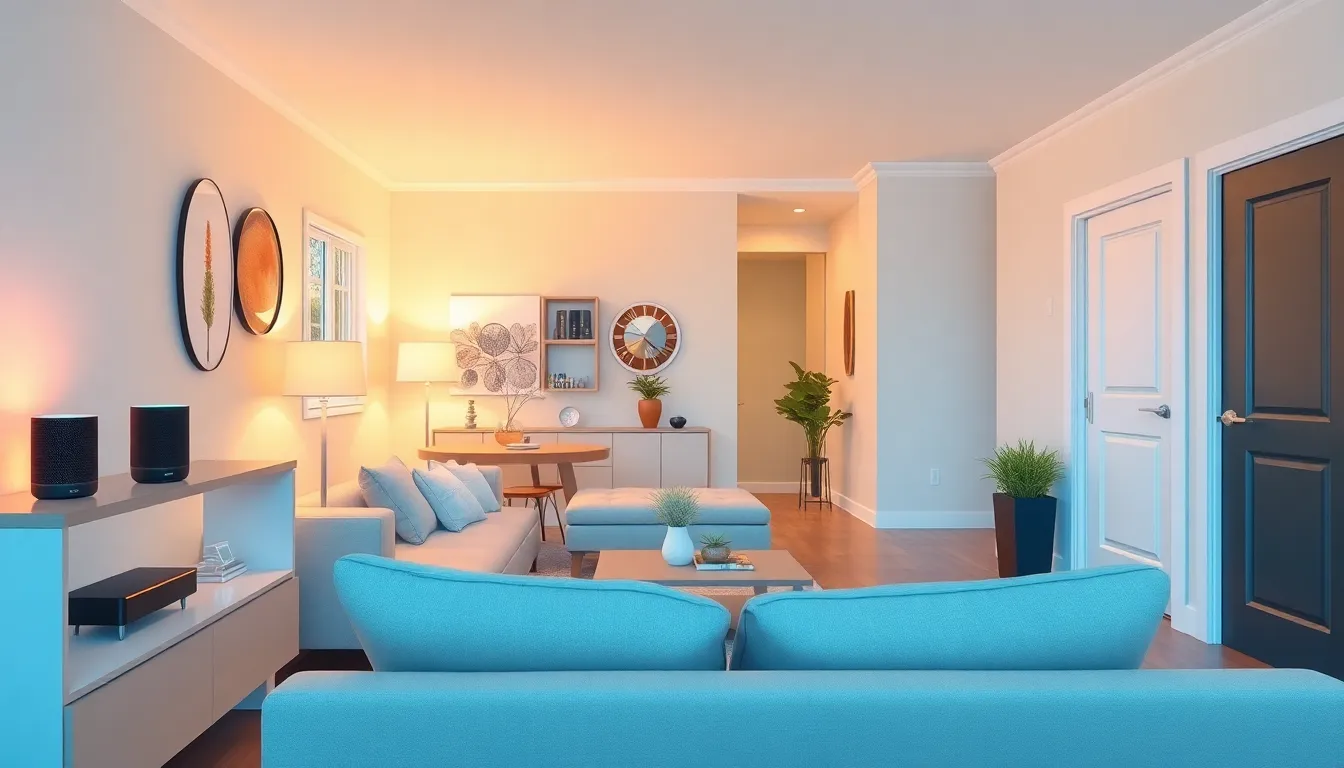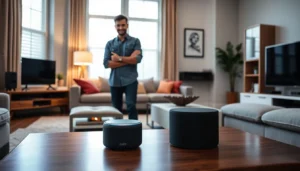Table of Contents
ToggleImagine walking into your home and having it greet you like a long-lost friend. With AI home improvements, that dream can become a reality. From smart thermostats that know when to kick on the heat to kitchen gadgets that can whip up dinner while you binge-watch your favorite series, AI is transforming how we live.
Overview Of AI Home Improvements
AI home improvements encompass a range of technologies that enhance how individuals interact with their living spaces. These innovations streamline daily tasks, optimize energy usage, and personalize environments.
Definition And Scope
AI home improvements involve integrating artificial intelligence into household devices and systems. Smart devices like thermostats adjust temperatures automatically based on user behavior. Additionally, security systems can analyze patterns and alert homeowners to unusual activities. Other AI applications include home automation for lighting and voice-activated assistants that manage tasks, making living spaces more efficient and user-friendly.
Importance In Modern Living
The significance of AI home improvements in modern living cannot be overstated. Energy efficiency increases as intelligent systems optimize heating and cooling based on real-time data. Convenience strikes as smart assistants handle routine chores, enabling individuals to focus on more meaningful activities. Enhanced security measures provide peace of mind through continuous monitoring and real-time alerts. In summary, these innovations redefine comfort, functionality, and safety in daily life.
Popular AI Technologies For Home Improvement

AI technologies increasingly shape home improvement, offering innovative solutions for enhanced living. These advancements enhance convenience, efficiency, and security within homes.
Smart Home Devices
Smart home devices refer to interconnected gadgets that elevate everyday experiences. Examples include smart speakers, intelligent lighting systems, and smart locks. Smart speakers, like Amazon Echo and Google Nest, serve as control hubs, managing a variety of connected devices. Intelligent lighting systems adapt brightness and colors based on user preferences, creating a tailored ambiance. Smart locks provide keyless entry, allowing users to secure their homes remotely. According to a 2023 report by Statista, nearly 70 percent of households utilize at least one smart device, showcasing their growing popularity.
Home Automation Systems
Home automation systems streamline multiple devices into an accessible platform for easy management. Users often leverage platforms like Google Home, Apple HomeKit, or Amazon Alexa for seamless integration. These systems enable automated scheduling, allowing routines for heating, cooling, and lighting based on personal needs. With automated security features, such as surveillance alerts and remote access, owners can monitor their homes real-time via mobile apps. The global home automation market was valued at approximately $80 billion in 2022, reflecting significant growth and interest in automated solutions.
Benefits Of AI Home Improvements
AI home improvements provide significant advantages for homeowners. These technologies streamline various aspects of daily living, enhancing convenience, comfort, and security.
Enhanced Efficiency
Enhanced efficiency stands out among the numerous benefits of AI home improvements. Smart thermostats automatically adjust temperatures, optimizing energy consumption. Intelligent lighting systems offer customizable brightness based on the time of day. Security cameras with AI capabilities analyze video feeds to detect unusual activities, ensuring safety. Home automation consolidates various tasks, allowing for seamless management of appliances and devices. Many users report reduced time spent on routine chores, enabling them to focus on more important activities. Research indicates that households leveraging these technologies enjoy an average increase of 30 percent in overall efficiency.
Cost Savings
Cost savings represent another critical benefit of adopting AI home improvements. Smart devices help reduce energy consumption, leading to lower monthly utility bills. For instance, intelligent thermostats can save homeowners an estimated $180 annually by efficiently managing heating and cooling. Implementing AI-enhanced appliances also minimizes waste through automated controls, increasing the lifespan of devices. Home security systems provide remote monitoring, reducing costs associated with traditional security measures. Statistics reveal that AI-driven homes can decrease overall maintenance expenses by up to 20 percent. By investing in these technologies, homeowners can achieve long-term financial benefits.
Increased Home Value
Increased home value emerges as a noteworthy advantage of integrating AI into living spaces. Prospective buyers often favor homes equipped with smart technologies, recognizing their enhanced functionality. Smart home features can elevate property listings and attract higher competitive offers. A National Association of Realtors report indicates that homes with smart device integrations appreciate more significantly in value, with increases ranging from 5 percent to 15 percent. Modern homebuyers prioritize energy efficiency, security, and convenience, making AI amenities more desirable. As such, incorporating smart systems not only improves daily living but also promotes long-term investment returns.
Challenges And Considerations
Integrating AI into home improvements presents several challenges that demand attention.
Privacy Concerns
Privacy issues become a significant consideration in AI home technologies. Many devices collect vast amounts of data, leading to risks of unauthorized access. Consumers often question how their personal information is stored and utilized. Ensuring robust security measures, like encryption and data anonymization, proves essential in protecting user data. Homeowners should remain vigilant about privacy policies associated with smart devices. Transparency from manufacturers regarding data handling fosters trust among users. Following best practices allows individuals to enjoy the convenience of AI while minimizing privacy threats.
Initial Investment Costs
Initial costs for AI home improvements can deter potential adopters. Smart devices often come with higher price tags than traditional alternatives. Investing in a complete home automation system may range from $2,000 to $20,000, depending on device types and installation complexity. While these upfront costs might seem daunting, long-term savings on energy bills can offset initial expenses. Homeowners frequently recognize the value in enhanced convenience and security justifying the investment. Understanding available financing options and tax incentives can aid in managing costs effectively. Exploring budget-friendly alternatives also offers an opportunity for gradual upgrades over time.
Future Trends In AI Home Improvements
AI home improvements continue to evolve, showcasing innovations that transform living spaces. These advancements not only enhance comfort but also optimize efficiency.
Upcoming Technologies
Voice-activated AI assistants are set to advance, offering homeowners even greater control over their environments. Smart mirrors that provide real-time feedback about health metrics will emerge, further integrating technology into daily routines. Predictive maintenance technologies are on the horizon, analyzing appliance performance to preemptively address issues. Enhanced security systems utilizing facial recognition and AI-driven surveillance will become commonplace, ensuring heightened safety. Furthermore, energy management systems will gain traction, automatically adjusting energy usage based on real-time analysis. All these technologies will contribute to a more connected, responsive home experience.
Predictions For The Market
By 2025, the smart home market is projected to reach $135 billion, driven by growing consumer adoption. Nearly 80 percent of homes are expected to include at least one AI-powered device, emphasizing industry momentum. As homeowners become more aware of the benefits of energy efficiency, their demand for smart thermostats and intelligent lighting systems will likely increase. Market analysts predict significant growth in home automation platforms, providing unified control of multiple devices. With rising interest, manufacturers will prioritize developing integrations that enhance user experience. The market will focus on affordability and expanded functionalities to encourage broader adoption among consumers.
AI home improvements are reshaping the way people interact with their living spaces. As technology continues to evolve homeowners can expect even greater convenience and efficiency in their daily lives. The integration of AI into household devices not only enhances comfort but also promotes energy savings and security.
While challenges like privacy concerns and initial costs exist, the long-term benefits often outweigh these hurdles. With the smart home market on the rise the future promises innovative solutions that will further enrich home environments. Embracing these advancements can lead to a more personalized and enjoyable living experience.




